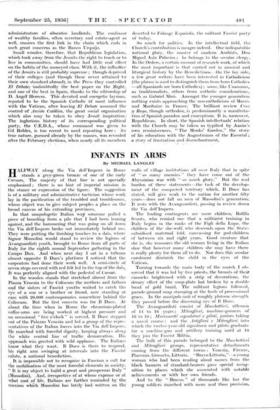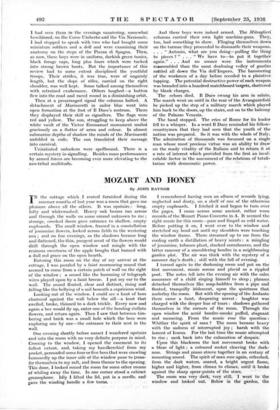INFANTS IN ARMS
By MICHAEL °LANGLEY
ALFWAY . along the Via dell'Impero in Rome stands 'a 'grey-green bronze of one of the early Caesars. The majesty of that line- is- not specially emphasised ; there is no hint of imperial mission in the stance or expression of the figure. The suggestion is of a military and administrative tactician whose work lay in the pacification of the troubled and troublesome, whose object was to give subject peoples a place on the broad canvas of his extending provinces.
In that unapologetic Italian way someone pulled a piece of boarding from a pile that I had been leaning against, and the hammering that was going on all down the Via dell'Impero broke out immediately behind me. They were putting the finishing touches to a dais, where Signor Mussolini would stand to review the legions of Avanguardisti youth, brought to Rome from all parts of Italy for the eighth annual September gathering in the Campo Dux. And when next day I sat in a tribuna almost opposite Il Duce's platform I noticed that the carpenters had done their work well. A semi-circle of seven steps covered with red felt led to the top of the dais,. It was perfectly aligned with the pedestal of Caesar.
In the wooden stands that stretched almost from the Piazza Venezia to the Coliseum the mothers and fathers 94. the sisters of Fascist youths waited to catch the eye of a son or a brother or friend, now standing at ease with 20,006 contemporaries somewhere behind the Coliseum. But the first concern was for Il Duce. At about the time when in Rome the chromium-plated coffee-urns are being worked at highest pressure and an occasional "five o'clock" is served, Il Duce stepped out of the Palaizo Venezia and led a group of the repre-. sentatives 'of the Italian forces into the Via dell'Impero. He marched with forceful dignity, keeping always along the white central line of traffic demarcation. His approach was greeted with wild applause. The Italians know what they want. Il Duce is there to respond, his right arm -swinging. at intervals into the Fascist salute, a national benediction.
It is impossible not to recognise in Fascism a cult. for the mobilisation: of-the most forceful .elements in society. " "It is my object to build. a great and - prosperous Italy " (Mussolini): ,And, irrespective of at whose expense or at what cost- of life, ,Italians. are further reminded by the Maxims which Mussolini has lately had written on the walls Of village institutions all over Italy that in spite of " so many enemies " they have come out of the Abyssinian war with " so much glory." But the real burden of these statements—the task of the develop. ment of the conquered territory which, II Duce has stated, will give work to the nation for another fifty years—does - not fall on men of Mussolini's generation; It rests with the Avanguardisti, -passing in review down the Via dell'Impero.
The, leading contingents are mere children, &Alta Scouts, who remind. -one that a militarist training. in Italy begins in the ranks of the Figli della Lupa: the children of the she-wolf, who descends upon the State- subsidised -maternal fold, canvassing for god-children of 'between six and eight years. Good creature that she is, she reassures the old woman living in the Italian shoe that however many children she may have there is really plenty for them all to -do. Nor does this secular enrolment diminish the child in the eyes of the Vatican.
Turning towards the main body of the march I ob- served that it was led by five priests, the breasts of their cassocks brightened with a strip of decorations, the dreary effect of the soup-plate hat broken by a double band of gold braid. The militant legions followed, parade-ground snap stamping at the heels of processional grace. In the inanipolo unit of roughly platoon' strength they passed before the discerning eye of II Duce. • The Avanguardisti consist of Moschettieri, riflemen of • 14 to 16 'years ; Mar aglieri, machine-gunners of 16 to 18; Marinaretti segnalatari e piloti, juniors taking a naval course ; and the Artiglieri e Mitraglieri into Which the twelve-year-old signalmen and pilots graduate far a machine-gun and artillery training until at 18 they join the Fascist Militia.
The bulk of this parade belonged to the Moschettieri and Mitraglieri groupS,' representative detachments coming from the different towns : Venezia, Firenze, Piacenza, Grosseto, Littoria. . "Bravo Littoria,"—a young woman who had been reading aloud names from the black banners of standard-beirers gave special reeOg- nition to -places which 'she associated with notable achievements or With her.-own friends. •• •: And to the " of - thousands like her the young soldiere marched with More Zeal' than 'precision. I had seen them in the evenings sauntering, somewhat bewildered, on the CorSo Umberto and the Via Nazionale. I had stopped to speak with. two who had bought some miniature soldiers and a .doll and were examining .their anatomy on the steps of the Piazza di Spagna. Then, as now, these boys were in uniform, darkish green tunics, black forage caps, long plus-fours which were tucked into strong brown boots. But the importance of this review had to some _extent disciplined the youthful troops. Their strides, it was true, were of ungainly length, but the slope of rifles, carried on the right shoulder, was well kept. Some talked among themselves with retrained exuberance. Others laughed—a button flew into the road and raced round in a diminishing orbit.
Then_ at. a prearranged signal the columns halted. A detachment of Marinaretti in sailor blue went into open formation at the foot of Il Duce's rostrum. There they displayed their skill as signallers. The flags were red and yellow. The sun, struggling to keep aboye the white vault of the Victor Emmanuel monument smiled graciously on a flutter of arms and colour. In almost submarine depths of shadow the minds of the MatInaretti unfolded in code. The sun translated their message, into carnival.
Uninitiated onlookers were spellbound. There is a certain mystery in signalling. Besides mass performances by armed forces are becoming ever more 'elevating to the neo-tribal multitude. - And these boys were indeed armed. The Mitraglieri columns carried -. their own light machine-guns. They; too, had something to show. , Flinging themselves down on the tarmac they proceeded to dismantle their weapons.
. . " Antonio, what are you doing=pulling the thing to pieces ? " . . " We have to—to put it together again." . . . And no sooner were the instruments reassembled' than the most deafening volley of gunfire rattled all- down the Via dell'Impero. The hammering of the workmen of a day before receded to a plaintive tapping. The potential destructive poWer of each weapon was branded into a hundred matchboard targets, shattered by blank charges.
The echoes died. Il Duce swung his arm in salute. The march went on until in the rear of the Avanguardisti he picked up the step of a military march which played him back to the doors, up the stairs, out on to the balcony of the Palazzo Venezia. - The band stopped. The cries of Rome for its leader fell to a whisper. In a word Il DuCe reminded his fellow- countrymen that they had seen that the youth of the nation was prepared. So it was with the whole of Italy. The admiration of thousands was focussed on a single, man whose most precious virtue was an ability to -draw on the ready vitality of the Italians and. to return it at a rate of interest which proirided from the first an incal= culable 'factor in the assessment of the relations of totali tarian. with demoeratic power. (..



















































 Previous page
Previous page